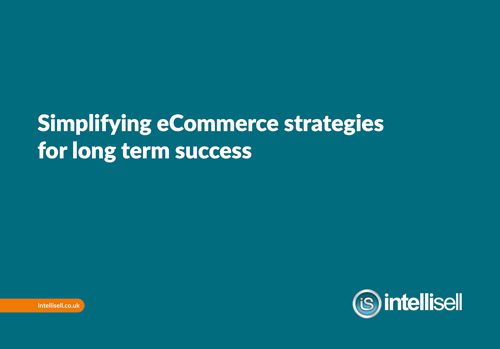Anyone interested in integrating Sage solutions with their eCommerce applications, marketplaces and channels will have questions.
Businesses will want to ensure that they’re connecting the right platforms in the right manner to meet their goals and solve current issues.
Below, our Intellisell product experts have answered the most common questions about software integration to help you create a single source of truth to run your enterprise.
Which systems do you integrate?
Intellisell will work with the majority of systems available to retail businesses. We integrate with marketplaces and channels and also connect with your Sage software, Sage 200, Sage X3, Sage Intacct and Sage 1000, please visit our Integrations page to find out more, or contact us to talk about your specific requirements.
What is an Enterprise Resource Platform (ERP) and B2B trade portal integration?
This is referring to the automation between the back office and your retail website. Integrating your systems ensures they work seamlessly together and eliminates the need for manual processes, saving you time, and money and ensuring accuracy and efficiency.
What is an eCommerce system or platform?
It is a system that enables electronic payments online. There are different ways that merchants can offer these payments. Some choose to offer fully integrated software solutions or third-party systems managed by service providers such as PayPal and WorldPay.
Many components make up an eCommerce system. These features could include; the shopping cart, integration capabilities, and security infrastructure. Each offers an important part in making sure that the system runs efficiently for both the merchant and their customers.
eCommerce integration involves implementing a shopping cart, merchant accounts, payment gateways, and security mechanisms with your website. This all helps to provide the merchant with an eCommerce system and a seamless shopping experience for the end customer.
So if we think of the software as the engine behind the scenes of an online store, then the system enables electronic payments. The software manages inventory, allows you to add or remove products, calculate the charges, order fulfilment etc.
By way of showing a friendly user interface people from non-technical backgrounds can manage the entire eCommerce operation. The back end of the interface is very multifaceted and a complex machine.
Any viable eCommerce software will enable customers to buy your products and services from your online store. Where solutions differ is the degree to which they can unify and leverage both front and back-office applications with both their unique and shared data. eCommerce platforms provide the unification of core business processes, where businesses can gain complete visibility across their company and ultimately meeting their most discerning customers’ expectations.
An eCommerce platform should allow for integrations between separate systems including; accounting, POS, inventory and order management, marketing, merchandising, customer service and financials on a cloud-based platform.
The benefits of having the software integrated allows you to provide reliable, consistent and personalised cross-channel experiences. You can offer superior customer service through a single view of all interactions and transactions across all touchpoints and channels.
You can also go above and beyond your customer expectations and increase your revenue by taking control of your orders and have one single view of what inventory you have across multiple channels and supply chains.
What are the most common types of eCommerce Software?
On-Premise: These are managed onsite by developers who take control of the manual updates and carry out any fixes that may need to be resolved. It offers merchants flexibility over hosted solutions. However, SaaS is becoming the preferred option, which you can discover more about below.
SaaS: Software as a Service (or “hosted”) solutions are much more detached from developers, in simple terms it isn’t maintained through company hard drives, you access it via the internet
The only requirements from development teams are usually for supplementary custom design features. You will be able to action any updates with one click or they happen automatically. This makes it a better choice for online merchants. It saves time for eCommerce stores using SaaS software and it’s also so much cheaper than on-premise solutions.
What is a payment gateway?
A payment gateway is a technology used by merchants to accept debit or credit card purchases from customers. So once you hit the buy button on a website, the payment gateway comes into action.
The next step is adding your bank card details. It is the front-end technology in charge of sending customer information to the merchant acquiring bank, for processing.
It then returns the transaction details and response from the payment network to the website you purchased from to inform them that the card is authorised, and therefore the order is completed.
In physical stores, payment gateways consist of the point of sale (POS) terminals used to accept credit card information by card or by smartphone. In recent years have begun accepting phone-based payments using QR codes or Near Field Communication (NFC) technology.
In online stores, payment gateways are the “checkout” portals used to enter credit card information or credentials for services such as PayPal.
Now that we have chip technologies, the signature phase on a credit/debit card has been replaced with a personal identification number (PIN) entered directly into the payment gateway hardware.
Contactless purchases are now so popular, and most of us now use our phones as payment devices instead of plastic credit cards.
What is the best payment gateway for Sage from a B2B website?
SagePay, now known as Opayo, is probably the most common for ecommerce websites that are integrated with Sage ERP systems.
However, Intellisell is able to work with your current or chosen payment gateway.
Would Intellisell work with our existing website?
Yes, the Intellisell eCommerce platform quite often works within or alongside existing websites.
Can I share and advertise new products and ranges?
Yes, Intellisell allows customers to showcase their campaigns, brochures, plus any additional sales aid material that you would like to give your customers access to.
Does Intellisell have live chat?
There are many live chat applications available. Intellisell can set up and configure your chosen live chat application. Whether this is via HubSpot, Spotify, Whats App or Zendesk, we can integrate live chat within Intellisell.
Can I give customers visibility of quotes from Sage online?
Quotes can be a large subject with many different ways to manage quotes. Intellisell enables your employees to share saved orders, or saved quotes, from the same screens allowing your sales team to negotiate and help close orders while giving the customer the option to pay on account or pro forma.
Can Intellisell integration with Warehouse and distribution channels?
Yes, we can connect with your current 3PL and drop-shipping channels or help you create new ones.
Intellisell can integrate with your Sage ERP software and departments such as goods-in, warehouse or logistics partners to improve operational efficiency.
Providing you visibility across the whole of your business and automating labour-intensive processes.
Are you a UK based Sage integration solution provider?
Intellisell is part of CPiO, which is one of the biggest Sage resellers in the UK. The team has a strong technical background with over 30 years of experience in providing smooth integration with Sage Intacct, Sage 200, Sage X3 or Sage 1000.
Supported by Sage experts, we’re proud to have established a successful business with over 400 clients as well as working with key integration partners, marketplaces and channels.
We are based in the Midlands with customers spanning the UK and EU. Find out more on our about us page.
We have an order management system and use 3PL, does Intellisell for Sage integrate with these systems?
Yes, we have many customers that use various task-specific applications that they need to be connected and integrated into their ecommerce strategy.
As Sage experts that specialise in integrations and ecommerce, we are uniquely placed to be able to provide your business a wider range of services and technical support suitable for multichannel and online trading businesses that use Sage software.
Is there a PIM (Product Information Management System) that works with Sage?
Yes, we work with one of the leading product information management system providers in the UK market.
Pimberly is our preferred PIM solution for Sage.


